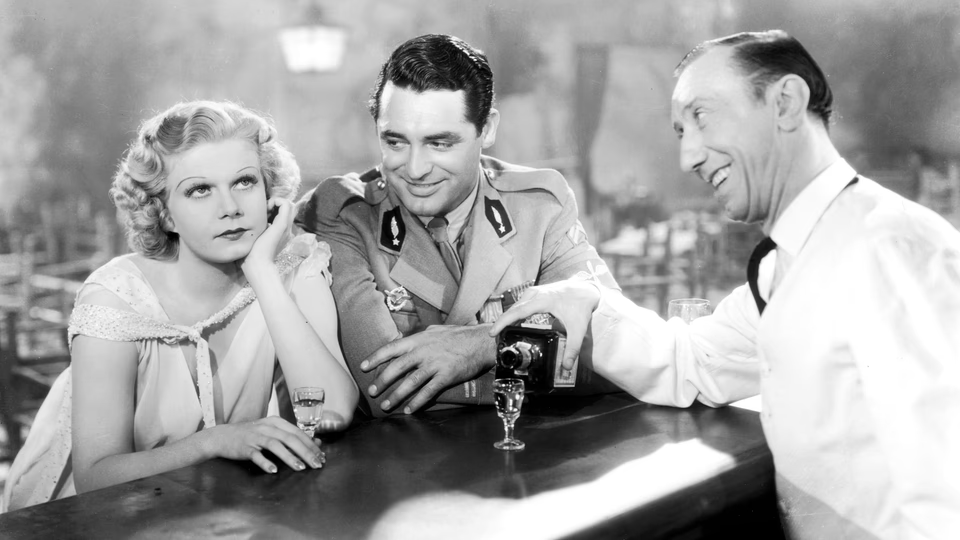Suzy

Jean Harlow plays Suzy, an American showgirl in London who falls for inventor Franchot Tone, flees a murder accusation, marries a philandering French air ace played by Cary Grant, then helps foil an espionage ring.
If this seems disjointed, then I have conveyed a sense of the viewing experience. The script has grafted two different movies together. The first, a rom-com, sees Harlow and Tone meet cute and fall in love. Tone sports an unidentifiable accent—maybe Irish?—that comes and goes. Harlow sports penciled eyebrows above her real ones. One night, Tone takes Harlow to the factory where he works and shows her the airplane stabilizer invention he’s laboring on after hours.
While there, the factory owner arrives with a cadre of shady folks. Harlow and Tone hide as the group files into the owner’s office. One of the group gestures to the transom window, where they see Tone’s smiling, eavesdropping face.
Angry at Tone, the owner fires him. Tone leaves, but Harlow stays and hears the group speaking German. When Tone returns for Harlow, the owner offers him a raise and promotion. Tone accepts and he and Harlow marry, but when they return to Harlow’s, one of the shady group arrives and shoots Tone.
Harlow stands in a stunned stupor, because calling out would interfere with the plot. Instead, hearing the gunshot, a neighbor investigates. Seeing Harlow over Tone’s body, the neighbor pronounces her the killer—despite no gun or motive.
Now the film shifts to wartime melodrama.
Harlow flees to Paris, where she gets a job in a cabaret. Thirty-one minutes into the film, she meets Grant, a hotshot ace pilot. Grant plays Grant and doesn’t convince in the part, but still proves a welcome presence. They fall in love and marry. Grant, who comes from money, takes her to his ancestral estate, where Harlow will live with his father.
Grant proves ill-suited for married life. After returning to the front, he visits Harlow less and less, claiming shortened or cancelled leave, while carrying on affairs in Paris. Harlow writes, but Grant doesn’t reply. Instead, Harlow forges replies she reads to Grant’s father.
Soon a war-wound lands Grant in the hospital. Harlow travels to be with him. Unbeknownst to her, Tone survived the shooting and succeeded in his stabilizer invention. He’s in Paris to deliver planes with his stabilizer to Grant. Harlow and Tone meet in Grant’s room, but hide their mutual surprise.
Harlow later returns to Grant’s room to find him kissing another woman. The same woman who shot Tone.
Desperate, Harlow turns to Tone for help, certain the woman is a German spy. Tone accompanies Harlow to confront Grant, who’s visiting the woman before flying a secret mission. Harlow stumbles through overwrought dialogue like, “Crazy? If trying to save military information from getting to the enemy is crazy, then I’m crazy!”
Grant dismisses their accusations until the woman shoots him. Now Tone faces a dilemma: he either gets a doctor for Grant, or flies Grant’s mission in Grant’s stead. Never mind the mission is compromised. That would spoil the dramatic tension. Tone opts for the flight with Grant’s blessing, crashing the plane at the end to make it appear Grant died in action. At Grant’s funeral, a German ace drops flowers.
Suzy, adapted from a novel by Herbert Gorman, has four credited writers. One suspects either the screenwriters excised much of the novel in the adaptation, or the source somehow juggled these disparate tones better.